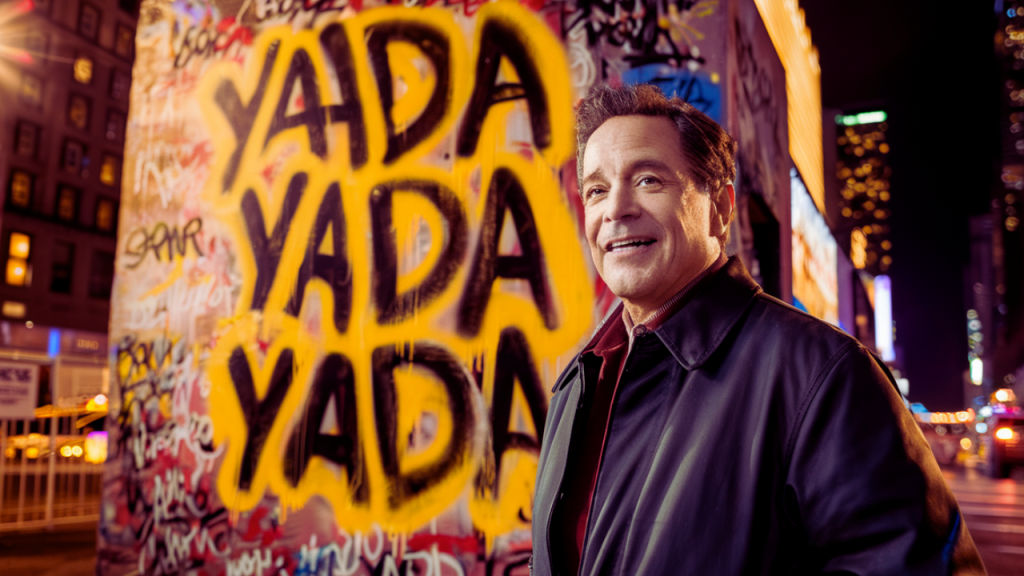Jerry Seinfeld. Two syllables that conjure up images of puffy shirts, soup Nazi confrontations, and exasperated shouts of “Serenity now!” But beneath the veneer of observational humor and neurotic quirks lies a comedian who revolutionized the sitcom landscape.
His eponymous show, “Seinfeld,” defied convention, eschewing heartwarming sentimentality for the hilarious mundanity of everyday life.
Seinfeld’s brand of humor hinges on the minutiae of existence. Is a double dip a social faux pas of epic proportions? Can a misplaced misplaced apostrophe truly drive a man to insanity?
These seemingly trivial concerns become the battlegrounds for his characters, a motley crew of New Yorkers whose self-absorption and social ineptitude provide endless comedic fodder.
The brilliance of “Seinfeld” lies in its lack of a central narrative. Each episode is a self-contained exploration of the absurdity inherent in social interactions, relationship dynamics, and even the most basic tasks, like waiting in line or returning a library book.
This episodic structure, a stark departure from the heartwarming family-centric sitcoms of the era, felt refreshingly honest. It mirrored the randomness of real life, where laughter can erupt from the most unexpected situations.

Beyond the “show about nothing” tagline, a deeper examination reveals Seinfeld’s keen eye for human behavior. He dissects our social anxieties, our petty squabbles, and our relentless pursuit of minor personal victories.
The characters, though exaggerated for comedic effect, resonate because they tap into a universal truth: we’re all just trying to navigate the awkward dance of social interaction, often failing spectacularly in the process.
Seinfeld’s legacy extends far beyond the nine seasons of his iconic show. He ushered in an era of “anti-heroes” on television, paving the way for shows like “Curb Your Enthusiasm” and “It’s Always Sunny in Philadelphia” that reveled in the uncomfortable and the politically incorrect.
His observational humor continues to influence stand-up comedians today, reminding us that humor can be found in the most mundane aspects of our lives.
Conclusion
So, the next time you find yourself in a disagreement over a double dip or witness a public display of social ineptitude, remember Jerry Seinfeld. He may not have given us heartwarming lessons or sentimental characters, but he offered something far more valuable: a hilarious reflection of ourselves, warts and all. His show wasn’t just “about nothing”; it was about the complex tapestry of human behavior woven from the threads of everyday life.
FAQ
- Was Seinfeld really about nothing?
While the show lacked a central narrative arc, it explored the humor inherent in everyday situations. Imagine a sitcom that dissects the social etiquette of ordering soup, the frustration of a malfunctioning answering machine, or the existential dread of a misplaced comma.
Seinfeld didn’t shy away from the seemingly trivial; instead, he mined these mundane occurrences for comedic gold. As Seinfeld himself has said, it was “about a group of friends who don’t go out of their way to help each other,” a refreshingly cynical take on the idealised friendships often portrayed on television.
- Is “Seinfeld” still funny today?
The show’s enduring popularity is a testament to its timeless exploration of human behavior. Social awkwardness, relationship dynamics, and the absurdities of daily life haven’t changed much, making the humor relatable even for a new generation.
Consider the timeless appeal of navigating office politics, the pressure to find a decent apartment in a competitive market, or the perils of online dating – all areas that “Seinfeld” explored with scathing wit. These relatable situations, coupled with the show’s sharp writing and iconic characters, ensure that “Seinfeld” remains a pop culture touchstone.
- What is the significance of the phrase “Yada Yada Yada?”
This nonsensical phrase, often used by George Costanza, became a pop culture phenomenon. Beyond its comedic value, “Yada Yada Yada” serves a linguistic purpose.
It functions as a placeholder, signifying the dismissal of unimportant details or a desire to avoid elaboration. Think of it as a verbal shrug, a way of saying “let’s move on” without actually saying it. The ubiquity of the phrase speaks to its effectiveness in capturing a specific nuance of human communication – that sometimes, the less said, the better.
- Was Seinfeld really about nothing?
The now-iconic “show about nothing” tagline was intended as a playful jab at the saccharine sentimentality that often dominated sitcoms. While the narrative lacked a central arc spanning seasons, each episode functioned as a hilarious deep dive into the minutiae of daily life.
Imagine a show that dissects the social etiquette of ordering soup, the frustration of a malfunctioning answering machine, or the existential dread of a misplaced comma. Seinfeld didn’t shy away from the seemingly trivial; instead, he transformed these mundane occurrences into comedic gold.
As Seinfeld himself has said, it was “about a group of friends who don’t go out of their way to help each other,” a refreshingly cynical take on the idealised friendships often portrayed on television. In essence, “Seinfeld” wasn’t about nothing; it was about the complex tapestry of human behavior woven from the threads of everyday life.
- Is “Seinfeld” still funny today?
The show’s enduring popularity is a testament to its timeless exploration of human nature. Social awkwardness, the intricacies of relationships, and the absurdities of daily life haven’t changed much, making the humor relatable even for a new generation.
Consider the timeless appeal of navigating office politics, the pressure to find a decent apartment in a competitive market, or the perils of online dating – all areas that “Seinfeld” explored with scathing wit.
These relatable situations, coupled with the show’s sharp writing and iconic characters, ensure that “Seinfeld” remains a pop culture touchstone. Even the show’s fashion choices, once emblematic of the late 80s and early 90s, have transcended time.
The “puffy shirt” episode, for example, is still hilarious because it taps into the universal human experience of succumbing to a fleeting trend and living to regret it.
- What is the significance of the phrase “Yada Yada Yada?”
This nonsensical phrase, often used by George Costanza, became a pop culture phenomenon. Beyond its comedic value, “Yada Yada Yada” serves a linguistic purpose.
It functions as a placeholder, signifying the dismissal of unimportant details or a desire to avoid elaboration. Think of it as a verbal shrug, a way of saying “let’s move on” without actually saying it.
The ubiquity of the phrase speaks to its effectiveness in capturing a specific nuance of human communication – that sometimes, the less said, the better. “Yada Yada Yada” also injects a touch of absurdity into everyday conversations, reminding us not to take ourselves too seriously.






